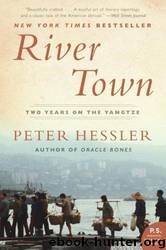River Town: Two Years on the Yangtze by Peter Hessler

Author:Peter Hessler
Language: eng
Format: mobi, epub
Tags: China) - Description and travel, International Relations, Peter - Travel - China - Fuling (Sichuan Sheng), Travel, Essays & Travelogues, Asia, General, Fuling (Sichuan Sheng, Political Science, Hessler, China, China)
ISBN: 9780060855024
Publisher: HarperCollins Publishers
Published: 2006-04-12T20:22:46+00:00
Wu River brand,
Fuling hot pickled mustard tuber!
It sounded much better in Chinese than it does in English, and the woman recognized it immediately. All of the Chinese were familiar with Fuling hot pickled mustard tuber and that was the easiest way to tell people where I was from. The woman and I talked for a while longer, and then she said something tactful about our China becoming more open to foreign countries. I thanked her and she returned to her part of the car.
The train grew hotter as we passed into the Turpan-Hami Basin, where the earth beside the tracks was cracked by the sun. The hills in the distance dropped steadily, and with them the horizon fell lower and lower, until at last the land was perfectly flat and the clear sky sat like a great dome of blue stretched taut above the black earth.
We stopped for an hour in the oasis city of Hami, where the station signs were in Arabic script as well as Chinese. It was the first place on this journey where I saw Uighurs; they were standing on the station platform, selling grapes and melons. The Uighurs had long sun-browned noses, and their features would have been at home in Saudi Arabia, or Turkey, or even Italy. Centuries ago many of them were caravan people, nomads who bought and sold along the Silk Road, and even today some spark of that same spirit inspires them to travel across China in search of business. Uighurs often work as black-market moneychangers in big cities, where they also sell raisins and fruitcake. Even in Fuling it is common for a couple of them to set up a fruitcake and raisin stand on a downtown street. They follow the Yangtze with their bushel baskets, drifting east, stopping in a city for a few weeks and then moving on. Of all the small entrepreneurs I saw in China, the Uighurs were the most remarkable—you’d find them two thousand miles away from home, and yet all they had was a basket of raisins and a tray of fruitcake. I had no idea how they made money.
At Hami the safety management worker and I stood there watching the fruit salesmen, and I asked him about relations between the Han and the Uighurs.
“We have problems,” he said. “Sometimes the guanxi is bad. Now our government helps their education, agriculture, economy, but still there are problems. It’s because of the history, not today’s policy. Every country has this kind of trouble—you have the same kind of problems with blacks in your America.”
It was a good point, and I told him that I didn’t think Xinjiang’s troubles were America’s affair. But I said that if it was a Chinese affair, it seemed strange that the violence in the spring hadn’t been discussed in the newspapers in Chongqing and Fuling.
“Sichuan is too remote. Bigger cities heard about what happened here.”
“What happened?”
“There were bombs,” he said, shrugging. “It was like Israel.”
“Does your company have any Uighur workers?”
“No.
Download
River Town: Two Years on the Yangtze by Peter Hessler.epub
This site does not store any files on its server. We only index and link to content provided by other sites. Please contact the content providers to delete copyright contents if any and email us, we'll remove relevant links or contents immediately.
| Arms Control | Diplomacy |
| Security | Trades & Tariffs |
| Treaties | African |
| Asian | Australian & Oceanian |
| Canadian | Caribbean & Latin American |
| European | Middle Eastern |
| Russian & Former Soviet Union |
The Secret History by Donna Tartt(19034)
The Social Justice Warrior Handbook by Lisa De Pasquale(12183)
Thirteen Reasons Why by Jay Asher(8885)
This Is How You Lose Her by Junot Diaz(6873)
Weapons of Math Destruction by Cathy O'Neil(6261)
Zero to One by Peter Thiel(5782)
Beartown by Fredrik Backman(5734)
The Myth of the Strong Leader by Archie Brown(5495)
The Fire Next Time by James Baldwin(5426)
How Democracies Die by Steven Levitsky & Daniel Ziblatt(5211)
Promise Me, Dad by Joe Biden(5141)
Stone's Rules by Roger Stone(5080)
A Higher Loyalty: Truth, Lies, and Leadership by James Comey(4947)
100 Deadly Skills by Clint Emerson(4914)
Rise and Kill First by Ronen Bergman(4776)
Secrecy World by Jake Bernstein(4739)
The David Icke Guide to the Global Conspiracy (and how to end it) by David Icke(4697)
The Farm by Tom Rob Smith(4501)
The Doomsday Machine by Daniel Ellsberg(4482)
